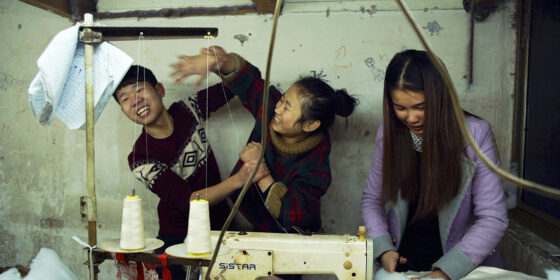TIFF 2023 | Youth (Spring) (Wang Bing, France / Luxembourg / Netherlands) — Wavelengths

By Michael Sicinski
This year, along with his somewhat more experimental featurette Man in Black, Wang released Youth (Spring), a 3 ½ hour direct-cinema examination of life and work in the garment workshops in the city of Zhili. As the title suggests, most of these workers are young men and women, averaging around 22 years old (although the youngest identified worker is a girl of 16). These workers are mostly from rural provinces, Anhui in particular, and although these piece-rate employees come and go, Wang’s approach suggests a bit more stability than one might expect. Within each workshop, he trains his camera on a small cohort or occasionally a couple, and so their personalities emerge even as the overall focus remains industrial and economic.
Since these workshops furnish room and board, placing the workers in dormitories, there are many moments in Youth that are very similar to what you might observe among first-year college students. There’s a lot of flirting, horseplay, grab-ass, and attitudinizing, all fairly universal behaviours for the age group, and one can see that they are experiencing a young-adult freedom in what for many is their first extended period away from home. But of course, these playful antics are punctuated by the constant roar of sewing machines and the frantic pace of their labour. Wang doesn’t ignore the fact that these workers are being exploited. But he makes it clear that their lives are complex, and cannot be reduced to that exploitation. In this regard, Youth stands in stark contrast to so many considerations of the Chinese workforce.
Since Wang moves from one workshop to the next, usually after 30 minutes of screen time, Youth is fairly modular in its construction. This can be a problem since, theoretically, the film could be an hour shorter, or twice as long, without really diminishing its achievement. And as the subtitle implies, Wang may be planning three additional films, which means Youth would rival West of the Tracks in sheer expansiveness. But Wang’s wide view does allow the viewer to make broad comparisons across the different shops. Sometimes the workers band together to try to get higher prices per piece. (They are paid, give or take, five yuan per garment, which is roughly $1 CAD.) At other times, we see that these workers are indeed free agents, implicitly competing with each other over production speed, minor benefits, and favour with the shop manager.
And individual moments of poetry do emerge, as in the final segment when a young woman is discussing her desire for love in short phrases, each punctuated with the bzzt of the sewing machine. Or an earlier moment when two women furtively throw a bag of trash over the dormitory wall, only to be upbraided the next day by a man on the ground. “You up there! Do you know what it means to live in a society?” In sum, Youth (Spring) is a document poised between specificity and generality, devoted to one small corner of capitalism run amok. And when we see how Wang’s subjects live meaningful lives in the midst of constant, repetitive labour, it shows that workers control production, and not vice versa.
Michael Sicinski

